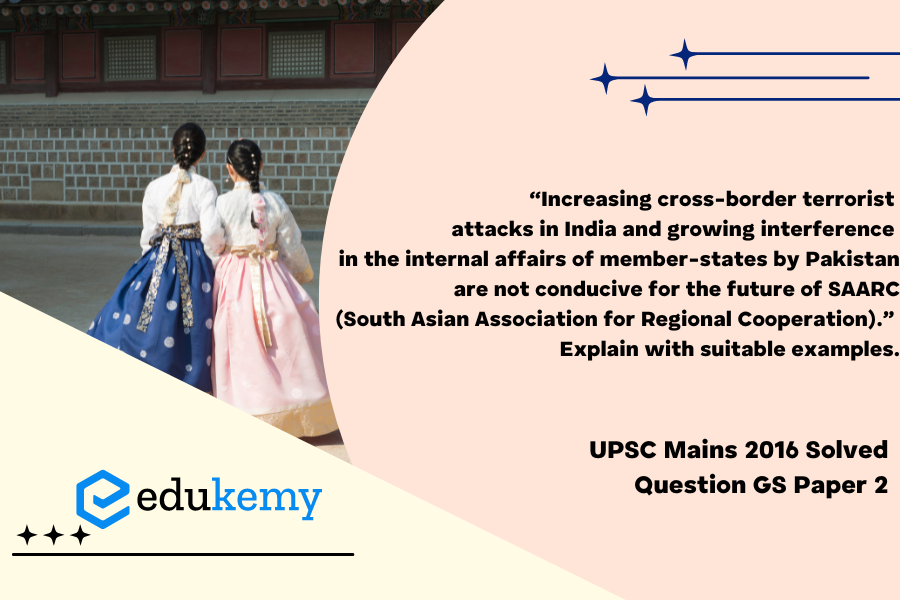The South Asian Association for Regional Cooperation (SAARC) was envisioned as a platform for fostering regional cooperation and economic integration among its member states. However, in recent times, the escalating frequency of cross-border terrorist attacks in India and the increasing interference in the internal affairs of member-states by Pakistan have cast a shadow over the prospects of the organization. The persistent acts of terrorism, emanating from across the border, have not only claimed numerous lives but have also strained diplomatic relations within the region. For instance, the 2008 Mumbai attacks, widely attributed to Pakistan-based terrorist groups, not only led to heightened tensions between India and Pakistan but also underscored the challenges faced by SAARC in maintaining a conducive environment for cooperation. Additionally, the growing interference in the internal affairs of member-states, particularly through the support of proxy groups and insurgencies, has further strained the trust and collaboration essential for the success of a regional organization. The alleged involvement of Pakistan in supporting separatist movements in countries like Afghanistan and its historical role in fueling the insurgency in Kashmir are illustrative examples. Consequently, the persistence of such destabilizing factors not only undermines the objectives of SAARC but also raises questions about the organization’s ability to serve as an effective forum for regional collaboration in the future. Addressing these challenges is crucial for the sustenance and success of SAARC, necessitating a concerted effort by member-states to promote peace, stability, and mutual respect within the region.
Tag: Government policies and interventions for development in various sectors and issues arising out of their design and implementation.
Contents
Decoding the Question:
- In the Introduction, try to briefly write about SAARC.
- In Body, discuss India’s decision to boycott the SAARC summit.
- In Conclusion, try to suggest a way forward,
Answer:
The South Asian Association for Regional Cooperation (SAARC) is the regional intergovernmental organization and geopolitical union of states in South Asia, which aims to accelerate economic growth, social progress, and cultural development in the region.

In the 31 years since the organization’s founding in 1985, SAARC’s efficacy in the region has been limited by tensions and disagreements between India and Pakistan. SAARC has largely been defunct for the last few years because of India-Pakistan friction and could soon become non-functional. This was highlighted in the aftermath of an attack by militants that crossed the Line of Control into India-administered Kashmir to strike at an Indian Army camp in Uri. Since the attack, the Indian government has strongly condemned Pakistan and looked to isolate Islamabad on the world stage. This was followed by India pulling out of the 19th SAARC Summit in Islamabad in November 2016. Afghanistan, Bhutan and Bangladesh also followed suit.
Regional Tensions and India’s Stand:
- India made a series of moves to isolate Pakistan diplomatically in the aftermath of the attack on the Indian Army base in northern Kashmir’s Uri.
- The government also decided to revisit the 56-year-old Indus Waters Treaty with Pakistan and maximize its utilization of the waters of three upstream rivers that were being used by Pakistan.
- India has also revoked the Most Favoured Nation status from Pakistan in trade.
- The announcement to boycott the SAARC summit comes as India has been unsparing in its attack, at the United Nations General Assembly, on Pakistan for sponsoring terror. India has also announced on the floor of the world body that Jammu and Kashmir is an integral part of India and will remain so.
- India remains steadfast in its commitment to regional cooperation, connectivity, and contacts but believes that these can only go forward in an atmosphere free of terror.
- India has pursued a “SAARC minus Pakistan” plan to push through with agreements it is keen on since Pakistan is blocking all protocols to better link the region.
All of the above limit the ability of SAARC to prosper as a regional organization. However, without effectively engaging Pakistan, the multiple challenges faced by SAARC countries on the economic and security fronts cannot be met satisfactorily. Much of the security challenges emanate from Pakistan because it uses terrorism as an instrument of its state policy. It stands between South Asia and Central Asia and holds the key to intra as well as inter-regional trade and commerce. Therefore, it is difficult to address the aforesaid challenges without roping in Pakistan into the SAARC framework for regional cooperation.
In case you still have your doubts, contact us on 9811333901.
For UPSC Prelims Resources, Click here
For Daily Updates and Study Material:
Join our Telegram Channel – Edukemy for IAS
- 1. Learn through Videos – here
- 2. Be Exam Ready by Practicing Daily MCQs – here
- 3. Daily Newsletter – Get all your Current Affairs Covered – here
- 4. Mains Answer Writing Practice – here


